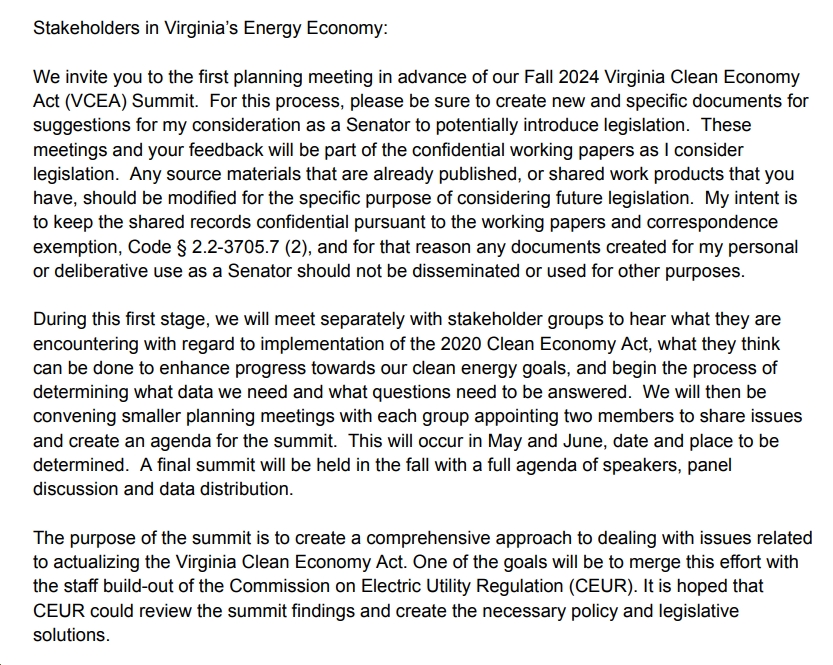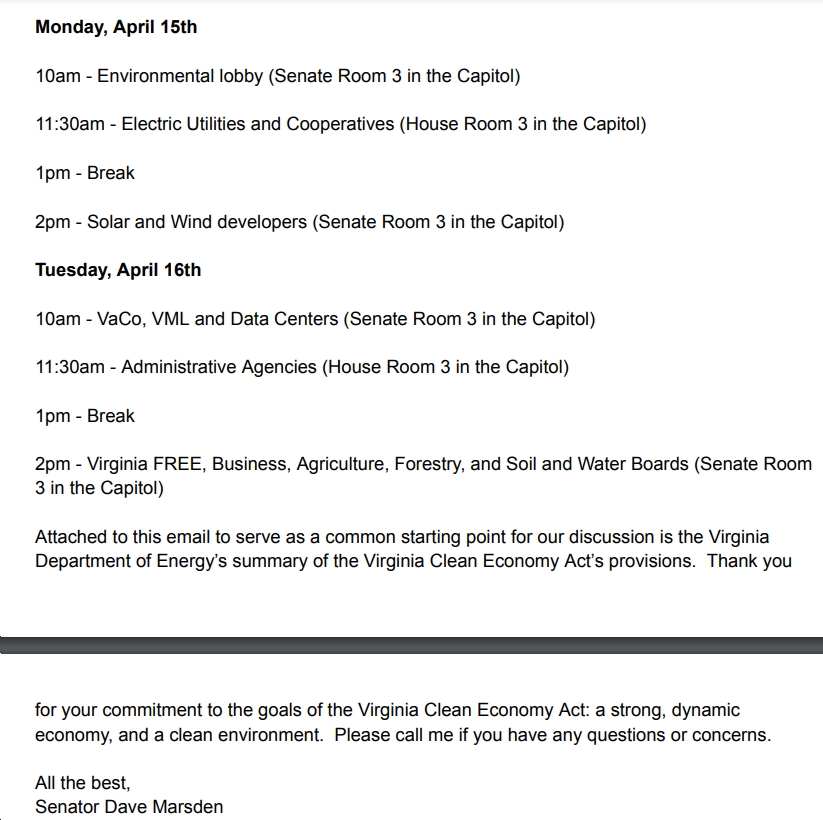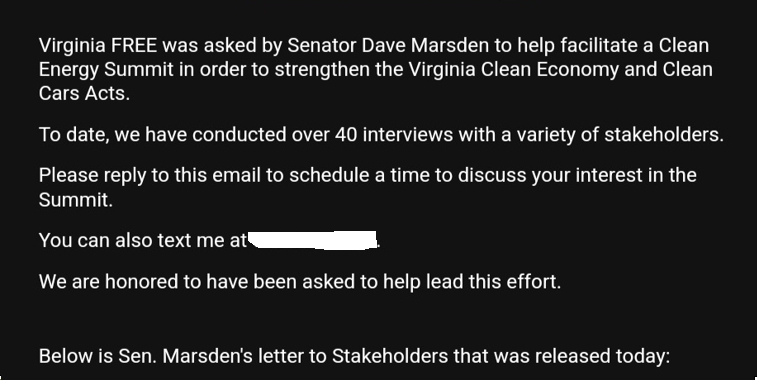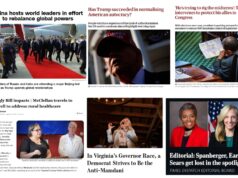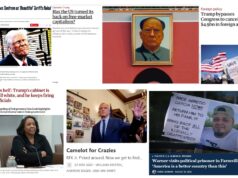By almost any metric, one of the most consequential pieces of legislation passed by the Democratic “trifecta” in 2020-2021 was the Virginia Clean Economy Act (VCEA) – patroned by Del. Rip Sullivan (along with chief co-patrons Lamont Bagby, Jennifer Carroll Foy, Dan Helmer and Alfonso Lopez) in the House of Delegates and by Sen. Jennifer McClellan (along with chief co-patrons John Edwards and Dave Marsden) in the State Senate. For more background on the VCEA, which was signed into law by Gov. Ralph Northam in April 2020, see:
- VAPLAN Analysis: Virginia Clean Economy Act “Includes Several Much-Needed Reforms to Our Energy Policy” BUT “Needs to Be Far More Aggressive”
- Virginia’s Clean Economy Act: Are Its Analytical Underpinnings Unduly Pessimistic?
- New Report Strongly Implies That the Virginia Clean Economy Act’s 2045/2050 Timeframe Is At Least a Decade Too Slow
- To Be or Not To Be a Clean Energy State, That Is the Question
- Video: “Virginia Clean Economy Act” Unveiled. Is It Adequate to the Challenges and Opportunities We Face?
Bottom line: the VCEA was (and is) a major piece of legislation – very significant by almost any metric – and *should* do a lot of good. On the other hand, it never was aggressive enough (e.g., the timeline should be much shorter – at least a decade – than 2045 or 2050), and it’s also subject to being undermined by fossil fuel interests (including major utilities like Dominion Energy and Appalachian Power), Republicans (but I repeat myself!), local opposition to clean energy projects, etc. If anything, in other words, VCEA needs to be *strengthened* and made *much more aggressive* – for a whole host of reasons, starting with the climate crisis of course, but also including the fact that clean energy is increasingly eating fossil fuel-generated power’s lunch, strictly from an economic standpoint (not even counting fossil fuel’s massive “negative externalities” – pollution, damage to people’s lungs/hearts, etc.). And VCEA definitely should NOT be weakened in any way OR made even more lucrative for Dominion Energy (which is already doing quite well off of VCEA, including the non-competitive offshore wind component, thank you very much!).
Which brings us to today, about four years since VCEA became law. Is Virginia’s clean energy transition proceeding as rapidly as the VCEA envisioned? I spoke with Sen. Dave Marsden, one of the bill’s chief co-patrons in the Senate, earlier this afternoon, and based on that – plus the email he sent to Virginia Scope – it sounds like there have been some “challenges,” and that Sen. Marsden wants to reassess the law’s implementation and progress, four years after its passage. Sounds like a good idea, in and of itself, but how to conduct that assessment is where the issues start to arise.
For starters, see below for an email from Sen. Marsden inviting “Stakeholders in Virginia’s Energy Economy” to “our Fall 2024 [VCEA] Summit.” The first thing that jumps out here is that Sen. Marsden states that the “meetings and your feedback will be part of the confidential working papers as I consider legislation,” and that his (Sen. Marsden’s) “intent is to keep the shared records confidential pursuant to the working papers and correspondence exemption…any documents created for my personal or deliberative use as a Senator should not be disseminated or used for other purposes.” Why would that be the case? In our conversation – and also in the Virginia Scope story – Sen. Marsden said it’s “standard process for these types of conversations with stakeholders to be considered working papers for potential legislation so that they can be candid with any feedback.” In stark contrast, per Virginia Scope:
“Megan Rhyne, the director of the Virginia Coalition for Open Government, says she has never seen anything like this.
‘I’ve never seen someone go to such lengths to try to control what private actors do with their information,’ she said in an interview.
Rhyne says that while bringing stakeholders to the table for conversations about how to legislate is a good idea because it helps everyone hash out issues to try and move forward, not allowing those people at the table to discuss the matter once they leave doesn’t make sense.”
Not surprisingly, I’m much closer to Rhyne’s view on this; especially with a law THIS important, far reaching and consquential – and with the massive amount of money at stake, including from powerful players like Dominion Energy – I lean heavily towards making the discussions as open and transparent as possible.
The second issue that arises is what the exact purpose of these meetings would be. In my (short) conversation with Sen. Marsden earlier today, he said that this summit would be all about gathering information; that he’s had good conversations with League of Conservation Voters director Michael Town and other environmental and clean energy folks; that he’s talked to almost all of his Senate colleagues about this; etc. Also, according to Sen. Marsden, the summit will have representatives from environmental and clean energy groups, the utilities (Dominion and Appalachian Power), data center interests, etc. All of which could be fine, but…again, these meetings really should be open to the public and the press, and there DEFINITELY need to be people in the room at all times to push back on what invariably will be a torrent of bulls***, distortions, falsehoods, etc. from Dominion Energy lobbyists, etc.
Another thing that gave me pause was the invitation from Sen. Marsden to the strongly Republican-leaning/pro-corporate/fossil-fuel-friendly group Virginia FREE (comprised of members such as…yep, Dominion Energy, Washington Gas, Altria, etc. and headed up by Chris Saxman, a conservative and formerly a Republican delegate). Why would a group like this be helping to “facilitate” the summit supposedly STRENGTHENING a crucial law pertaining to Virginia’s transition from fossil fuels to clean energy? Seems…odd, let’s just say.
There’s also the issue of who’s invited and who isn’t invited to this summit. I spoke with Sen. Danica Roem late this afternoon, and our conversation about this summit focused – perhaps unsurprisingly – on an issue that residents of her district care passionately about, namely data centers. According to Sen. Roem, she has no problem with “get[ting] in the room and…get all the facts on the table…prior to filing legislation,” but:
“…as the Senator for the 30th district, who would not be one of the people presenting or participating or even speaking at something like this…I need to represent the Coalition to Protect Prince William County, for example, and the people who they work hand in hand with, like the Piedmont Environmental Council…both LCV and Sierra Club are statewide organizations…they’re basically looking at things from a 30,000-foot view very often; you need the people who are on the ground dealing with rezoning applications…testifying in front of planning commissions…you need that perspective represented at any gathering where you have industry people representing the utilities…data centers…you need citizen input from citizen-led organizations…that’s what the Coalition to Protect Prince William County is…You have to have those citizen-led groups not only informed about what’s going on, but they have to have a seat at the table…It would behoove everyone who is involved in putting together something like this in Richmond to at least have the Coalition to Protect Prince William County, the Piedmont Environmental Council…they should have a seat at the table not as spectators but as stakeholders who will be able to speak very in depth to the issues that are going on in the area that is now the data center capital of the world…”
I also asked Sen. Roem – formerly a news reporter for many years – about the issues of transparency (or lack thereof) on this summit. According to Sen. Roem, she’s “one of the only legislators…who for seven years in a row has filed legislation to strengthen the Virginia Freedom of Information Act” – so obviously she’s committed to the public’s right to know what their government’s up to. In the end, Sen Roem’s argument is that “I want my constituents to know everything that’s going on…We should have an open door.” I couldn’t agree more – especially when you’ve got people in the room from the very corporations that stand to make a LOT of money off of this law as it is now, as well as from any changes to the law that might come out of a mostly-in-secret summit with those same corporations. Is that the “Virginia Way” (chumminess/”revolving door” between legislators and corporate lobbyists) epitomized or what? Yeah, no thank you.
